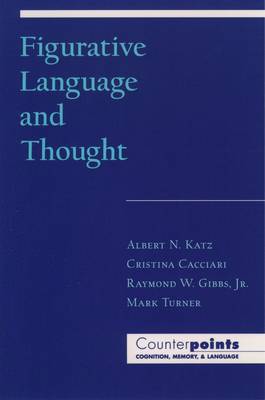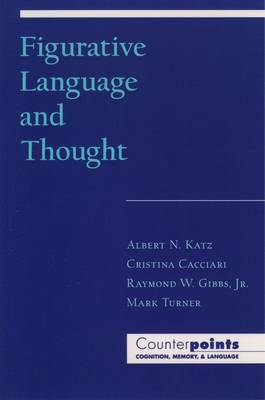
- Afhalen na 1 uur in een winkel met voorraad
- Gratis thuislevering in België vanaf € 30
- Ruim aanbod met 7 miljoen producten
- Afhalen na 1 uur in een winkel met voorraad
- Gratis thuislevering in België vanaf € 30
- Ruim aanbod met 7 miljoen producten
Zoeken
Omschrijving
Our understanding of the nature and processing of figurative language is central to several important issues in cognitive science, including the relationship of language and thought, how we process language, and how we comprehend abstract meaning. Over the past fifteen years, traditional approaches to these issues have been challenged by experimental psychologists, linguists, and other cognitive scientists interested in the structures of the mind and the processes that operate on them. In Figurative Language and Thought, internationally recognized experts in the field of figurative language, Albert Katz, Mark Turner, Raymond W. Gibbs Jr., and Cristina Cacciari, provide a coherent and focused debate on the subject. The book's authors discuss a variety of fundamental questions, including: What can figures of speech tell us about the structure of the conceptual system? If and how should we distinguish the literal from the nonliteral in our theories of language and thought? Are we primarily figurative thinkers and consequently figurative language users or the other way around? Why do we prefer to speak metaphorically in everyday conversation, when literal options may be available for use? Is metaphor the only vehicle through which we can understand abstract concepts? What role do cultural and social factors play in our comprehension of figurative language? These and related questions are raised and argued in an integrative look at the role of nonliteral language in cognition. This volume, a part of Counterpoints series, will be thought-provoking reading for a wide range of cognitive psychologists, linguists, and philosophers.
Specificaties
Betrokkenen
- Auteur(s):
- Uitgeverij:
Inhoud
- Aantal bladzijden:
- 208
- Taal:
- Engels
- Reeks:
Eigenschappen
- Productcode (EAN):
- 9780195109634
- Verschijningsdatum:
- 10/09/1998
- Uitvoering:
- Paperback
- Formaat:
- Trade paperback (VS)
- Afmetingen:
- 152 mm x 229 mm
- Gewicht:
- 303 g

Alleen bij Standaard Boekhandel
+ 196 punten op je klantenkaart van Standaard Boekhandel
Beoordelingen
We publiceren alleen reviews die voldoen aan de voorwaarden voor reviews. Bekijk onze voorwaarden voor reviews.











